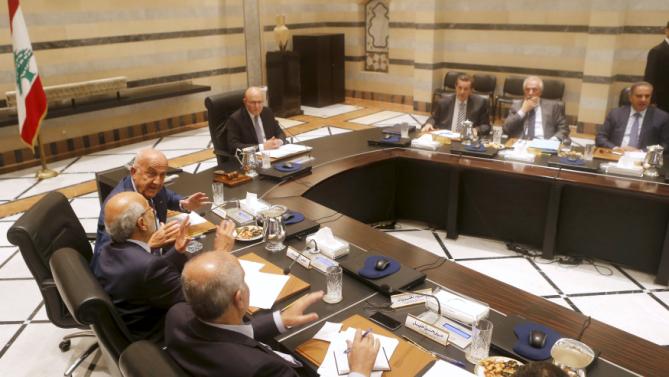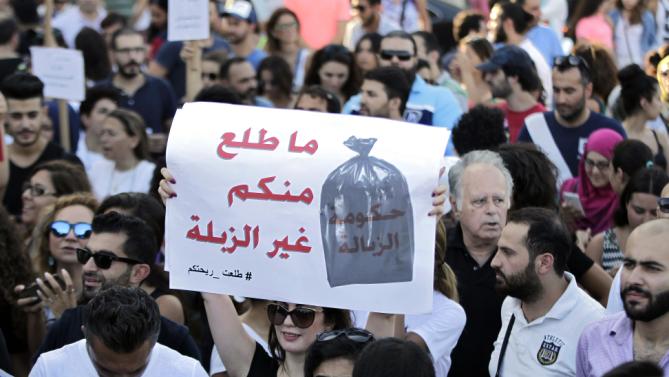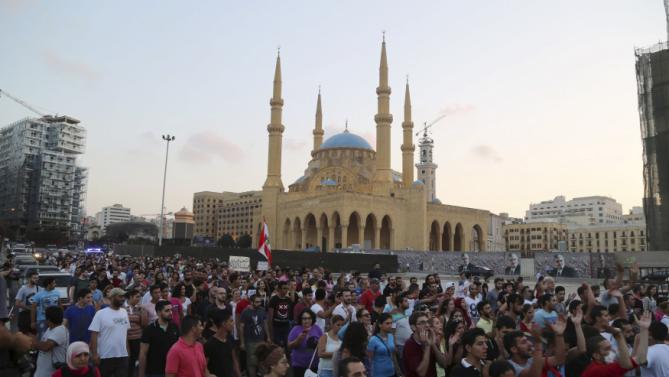
Lebanon's Prime Minister Tammam Salam heads a cabinet meeting at the government palace in Beirut, Lebanon August 27, 2015. The Lebanese group Hezbollah and allied Christian politicians are boycotting the cabinet meeting, deepening a political crisis that has paralyzed Prime Minister Salam's national unity government. REUTERS/Mohamed Azakir

n this Saturday, Aug. 8, 2015, file photo, a Lebanese protester chants slogans against the Lebanese government during a demonstration against the ongoing trash crisis, at the Martyrs square in downtown Beirut, Lebanon. Her placard in Arabic read: "We got nothing from you but garbage." Starting out as a small group of tech-savvy young activists who organized to protest the garbage that for weeks has been piling up on Beirut’s streets, Lebanon's "You Stink" movement has now grown into a popular uprising that seeks to nip at the power base of an entire political class. Arabic on sign reads: 'Nothing comes from you but garbage'. (AP Photo/Bilal Hussein, File)

Lebanese Army soldiers patrol downtown Beirut, during a protest against the trash crisis and government corruption, Lebanon, Wednesday, Aug. 26, 2015. Hundreds of people have kept up protests in Beirut as a crisis over garbage collection worsens with fresh piles of trash accumulating in streets of the capital. (AP Photo/Hassan Ammar)

People chant slogans and carry signs as they take part in a march from downtown Beirut towards the American University of Beirut (AUB) hospital, August 26, 2015, to express solidarity with a protester who was injured during clashes with police on Sunday.
The Lebanese group Hezbollah and allied Christian politicians will boycott a cabinet meeting on Thursday, deepening a political crisis that has paralyzed Prime Minister Tammam Salam's national unity government. Media run by Hezbollah and the Free Patriotic Movement (FPM) of Christian politician Michel Aoun, the Shi'ite group's main Christian ally, reported that Salam had been informed of the decision, but did not immediately give a reason for it.
REUTERS/Aziz Taher
The Wall Street Journal –
Lebanon’s convoluted system of governance has taken center stage this week, as public service demonstrations swell on the streets of downtown Beirut. The Mediterranean country’s current political system was forged after a 15-year civil war that ended in 1989 with the Saudi Arabian-negotiated Taif Agreement. Its parliamentary government system is based on securing representation for the country’s numerous religious sects. The system gives relatively small parties disproportionate political weight, enough to block important legislation.
Here are five things to know about who has power in the government.
#1: Parliament is Divided Among Religious Groups
Lebanon’s 18 recognized religious sects are all recognized in Parliament. The Parliament, with its 128 seats, is divided equally among Muslims and Christians. The most powerful of these political forces include Maronite and Greek Orthodox Christians, Shiite and Sunni Muslims and adherents to the ancient Druse faith. The president must be a Maronite Christian, the Prime Minister a Sunni Muslim, and the Speaker of Parliament a Shia Muslim.
#2: There Are Seven Main Parties
There are seven main political parties in Lebanon. These parties, along with several other smaller groups, are divided into two main political blocs. March 8 is a pro-Syria, Iran-backed umbrella group that includes the militant group Hezbollah and the Christian Free Patriotic Movement party. On the other side there’s Western-backed March 14, dominated by the Sunni Muslim majority Future Movement party, and two large Christian parties, Lebanese Forces and Kateab.
#3: There Has Been No President for More Than a Year
The country has not had a sitting president for over a year. Under the 1943 National Pact, the presidency must go to a Maronite Christian. As Lebanon’s Christians have emigrated out of the country and the Muslim population has increased, the power of the presidency has faded into a largely symbolic role. The Taif Agreement shifted many of the president’s responsibilities to the Council of Ministers and Prime Minister. Lebanon has been without a president for over a year due to the parliament’s inability to collectively agree on who should lead the country.
#4: Parliament Rarely Agrees
Parliament rarely agrees. Parliament has also been unable to agree on terms for fresh legislative elections since the last round of voting in 2009, nor on a president. On 31 May 2013, the Parliament extended its mandate for 17 months, and then extended it again on 5 November 2014 until June 2017. Experts argue that the extensions have little legal basis in the country’s constitution.
#5: Hezbollah Has Substantial Power
Hezbollah wields influence. Hezbollah, the armed Shiite Muslim group backed by Iran, holds 12 seats in the Parliament. Its political bloc, March 8, has veto power and holds 57 of 128 seats, giving Hezbollah a substantial amount of influence inside the government. Unlike other Lebanese political parties, Hezbollah is heavily armed and its military wing conducts itself much like an independent army. The group is closely allied with regime of Syrian president Bashar al-Assad and has for years sent its forces and military consultants into Syria to fight alongside his troops.
Young media-savvy Lebanese rally public over trash crisis, challenging entire political class
By SARAH EL DEEB, Associated Press
BEIRUT (AP) — First they egged the prime minister's building. Then they dumped some of the garbage piling up on Beirut's streets outside the home of the environment minister, furious the government couldn't get its act together to find a solution when Lebanon's main landfill shut down.
But perhaps the most electrifying move by the young, tech-savvy group of activists was when they spread their catchy slogan "You Stink" across social media. It helped turn the trash crisis into a popular uprising against a political class that has dominated Lebanon since its civil war ended in 1990.
The core founders of "You Stink" include one of the Middle East's most influential bloggers, as well as a creative media strategist, a rights lawyer, journalists and an actress whose film was banned by authorities for addressing touchy sexual issues. The group quickly picked up supporters from across the spectrum of Lebanon's divisive politics and sects.
"We are the future of this country and the agents of change. If the youth didn't do this, no one will do it," said Nadyn Jouny, a 25-year-old freelance journalist who is among the group's founding members.
She said the movement was a reflection of the growing frustration with an aging and corrupt political class that has failed to even show concern for people's woes. She called it "the regime of the warlords."
"You Stink" claims to have set aside ideology in its effort to mobilize support for an uprising against the political establishment. It says it seeks to ditch a patronage system that divvies up power to each of Lebanon's multiple communities — Shiites, Sunnis, Christians, Druze and more — in favor of a non-sectarian culture.
That system has been the center of Lebanese politics for decades and helped fuel the 15-year civil war — and critics say it leads politicians to spend more time cultivating their sectarian fiefdoms than actually governing.
"You Stink" is up against aging warlords and oligarchs who have passed power on to their sons and relatives for generations — and continue to hold the country's top positions with expansive business interests and powerful militias that helped them survive the war. Consecutive governments neglected to improve the country's infrastructure, leading to chronic water shortages and electricity cuts that continue 25 years after the war ended.
"The corruption has been around for so long. But the people have also now smelled it," said Tarek Sarhan, a 17-year-old "You Stink" supporter.
Jouny said the stench from the mounds of trash that blocked Beirut streets was a wake-up call to residents who took pride in their beautiful city. Two major rallies over the weekend brought some 20,000 people into the streets of the capital, numbers rarely seen in a country wary of the chaos in neighboring Syria.
The last time large numbers took to the streets was a decade ago, after the 2005 assassination of Prime Minister Rafik Hariri. Hundreds of thousands of people from all sects demonstrated in peaceful rallies that were dubbed the "Cedar Revolution." Those protests eventually led to the withdrawal of Syrian troops from Lebanon after a decades-old presence — but sectarian politics quickly returned.
The idea for "You Stink" began on Facebook, and the group has tried to avoid the mistakes of other Arab protest movements by reaching out to existing youth organizations to help coordinate, Jouny said.
Neamat Bader al-Deen is a leftist activist with a group that calls itself "We Want Accountability," one of several organizations collaborating with the movement.
"We are asking the government to resign because it failed to resolve the crises," the 34-year-old Bader al-Deen said. "We will not let this pass. This is robbery."